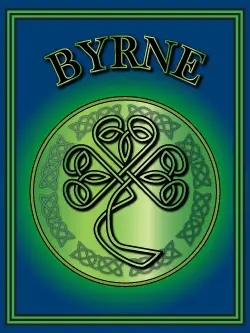Byrne is the seventh most common name in Ireland and it means ‘raven’. They have a long history of fighting for Irish freedom and have been pioneers in the world of religion, medicine and police work.
Byrnes were originally called O’Byrne. The Gaelic equivalent of O’Byrne was O’Broin which means ‘Descended from Branach’. Branach was known the son of Maolmordha, who was King of Leinster in the 11th century. Branach means ‘raven’ which is where the Byrne’s nickname is from.
The motto on the Byrne family crest states ‘Certavi et Vici’ which means ‘I have fought and conquered’.
Arrived in Wicklow
They originally ruled what is now Co Kildare but fled to the East during the Norman invasion and stayed in the mountains in Co Wicklow.
Together with the O’Toole clan they protected Wicklow against Norman or English invasion for centuries.
They eventually spread to Co Dublin and today, most Byrnes will have originated in one of those two counties.
The ‘O’ prefix to the name would have been dropped in the early 18th century when English rule meant it was a disadvantage to have an Irish sounding name.
Video of the story of the Byrne name
Fiach McHugh O’Byrne fought against the English
Fiach McHugh O’Byrne was the leader of the O’Byrnes in the 16th century. He was based in the mountains in Glenmalure and successfully defended Co Wicklow against the English. He also leant his support to the O’Neills of Tyrone.
He died in 1597 when he was captured and beheaded by the English. His head was impaled outside Dublin Castle. He is celebrated in the Irish folk song Follow Me Up to Carlow.
Famous Byrnes throughout history
Miles Byrne was born in 1780. He had a remarkable career as a soldier. He came from Co Wexford and when he was 18 he fought with the United Irishmen in the battle of Vinegar Hill during the 1798 rebellion.
He later went to France to enlist help for the rebels but ended up joining the Napoleonic army and spent 11 years fighting for them. He was a fine soldier and was made Chevalier of the Legion of Honour in 1813.
There were 187 Byrnes or other variations of the name who fought for the Americans during their War of Independence.
Pioneering Byrnes
Andrew Byrne was born in 1802 in Co Meath. He helped to spread Catholicism in America and was the first bishop of Arkansas.
John Byrne was a doctor from Co Down. During his first year of practice he cared for people as they died during the Famine. He later went to America and became a pioneer in the use of electrical surgery.
Thomas Byrne was a police chief who was born in Ireland in 1842 but emigrated to New York. He was a pioneer and is credited with introducing the ‘third degree’ interrogation technique which saw a move away from physical force and towards finding holes in a suspect’s story through mental strain.
